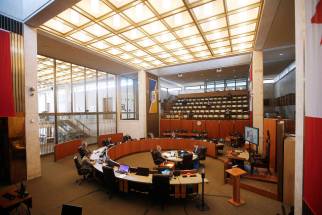Excessive FIPPA fees are unacceptable
Read this article for free:
or
Already have an account? Log in here »
To continue reading, please subscribe:
Monthly Digital Subscription
$0 for the first 4 weeks*
- Enjoy unlimited reading on winnipegfreepress.com
- Read the E-Edition, our digital replica newspaper
- Access News Break, our award-winning app
- Play interactive puzzles
*No charge for 4 weeks then price increases to the regular rate of $19.00 plus GST every four weeks. Offer available to new and qualified returning subscribers only. Cancel any time.
Monthly Digital Subscription
$4.75/week*
- Enjoy unlimited reading on winnipegfreepress.com
- Read the E-Edition, our digital replica newspaper
- Access News Break, our award-winning app
- Play interactive puzzles
*Billed as $19 plus GST every four weeks. Cancel any time.
To continue reading, please subscribe:
Add Free Press access to your Brandon Sun subscription for only an additional
$1 for the first 4 weeks*
*Your next subscription payment will increase by $1.00 and you will be charged $16.99 plus GST for four weeks. After four weeks, your payment will increase to $23.99 plus GST every four weeks.
Read unlimited articles for free today:
or
Already have an account? Log in here »
Hey there, time traveller!
This article was published 12/08/2022 (1214 days ago), so information in it may no longer be current.
‘Completely outrageous” is how one observer characterized the fees demanded by Manitoba Justice for the provision of documents requested under the Freedom of Information and Protection of Privacy Act.
Quite frankly, that barely begins to describe it.
Related coverage
The headline-ready observation by Kevin Walby, an access to information specialist and associate professor in the department of criminal justice at the University of Winnipeg, came on the heels of a revelation that the provincial justice department attached fees totalling nearly $32,000 to a trio of requests by the Free Press for documents related to a secret RCMP investigation into activities and transactions during the administration of Winnipeg mayor Sam Katz.
In May, investigative reporting by the Free Press revealed the existence of an RCMP initiative known as Project Dioxide — a criminal probe into a series of civic real-estate transactions, the construction of four new Winnipeg Fire and Paramedic Service stations and an (aborted) associated land swap.
The project ran parallel to another RCMP investigation, Project Dalton, which focused on the long-running investigation into alleged multi-million-dollar fraud related to the construction of the Winnipeg Police Service headquarters.
In May, an RCMP spokesperson confirmed the existence of Project Dioxide to the Free Press and noted that it closed without criminal charges being laid, but declined to offer any further information. The Free Press subsequently submitted three FIPPA requests to Manitoba Justice, seeking documents related to Project Dioxide for specific time periods.
The fee demands delivered in response were $14,100, $7,200 and $10,680 — a total of $31,980 — in order for the requests for public documents to be fulfilled. In a written statement, Manitoba Justice defended the exorbitant price tag by describing the requested review of five years’ worth of documents as “an enormous undertaking.”
MIKE APORIUS/WINNIPEG FREE PRESS FILES Former Winnipeg mayor Sam Katz
Another school of thought hews to the view the stated fees are simply indefensible.
“It’s political, and FIPPA never should be,” said Mr. Walby. “I think it’s a political strategy of government agencies to block access to the public. … It’s a case with obvious public interest. It’s pretty sloppy and pretty amateur to just do a grandiose fee estimate, because it’s so blatantly wrong.”
And according to Duff Conacher of Democracy Watch Canada, “The public should never have to pay twice for information that has been gathered by a government institution. … They should not be allowed to charge fees for these kinds of requests, and certainly should not be requesting these kinds of excessive fees to discourage the public from accessing the information.”
While it’s reasonable to assume there could be costs associated with assigning staff to process and produce information sought under FIPPA, and that an administrative fee could be imposed for the completion of the task, the excessive nature of the charge affixed to the response to these requests can only be interpreted as a blatant effort to block access to the related information — information the public is fully entitled to access and assess.
“The public should never have to pay twice for information that has been gathered by a government institution.” – Duff Conacher
It’s in keeping with the more general inclination of the current Progressive Conservative government — first under former premier Brian Pallister, and continuing with Premier Heather Stefanson in charge — to stifle public access to information, whether by routinely making elected officials unavailable to comment on pressing issues, or by cynically introducing bills in the legislature with headings but no explanatory text, or by allowing government departments to conjure up wildly excessive charges that guarantee freedom of information is anything but free.
Outrageous? As descriptives go, it’s a passable start. Full access to a thesaurus might be necessary, however, to string together enough adjectives to fully encapsulate the outrage.







